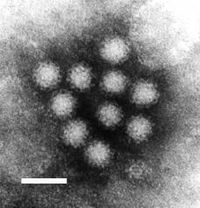
Norovirus waterborne outbreak in Chalkidiki, Greece, 2015: detection of GI.P2_GI.2 and GII.P16_GII.13 unusual strains
Sign Up to like & getrecommendations! Published in 2019 at "Epidemiology and Infection"
DOI: 10.1017/s0950268819000852
Abstract: Abstract Noroviruses, along with rotaviruses, are among the leading causes of gastroenteritis worldwide and novel strains are periodically emerging. In August 2015, an unusual increase of gastroenteritis cases occurred in a touristic district in Kassandra… read more here.
Keywords: gii; chalkidiki; gii p16; norovirus ... See more keywords

Changing Predominance of Norovirus Recombinant Strains GII.2[P16] to GII.4[P16] and GII.4[P31] in Thailand, 2017 to 2018
Sign Up to like & getrecommendations! Published in 2022 at "Microbiology Spectrum"
DOI: 10.1128/spectrum.00448-22
Abstract: In the present study, the prevalence of norovirus infection in children with acute gastroenteritis in Chiang Mai, Thailand between 2017 and 2018 was 14.9%. A variety of norovirus genotypes were detected, including GI.5, GII.2, GII.3,… read more here.
Keywords: p16 gii; norovirus; gii gii; gii ... See more keywords

Association of GII.P16-GII.2 Recombinant Norovirus Strain with Increased Norovirus Outbreaks, Guangdong, China, 2016
Sign Up to like & getrecommendations! Published in 2017 at "Emerging Infectious Diseases"
DOI: 10.3201/eid2307.170333
Abstract: An unusual prevalence of recombinant GII.2 noroviruses (GII.P16-GII.2) in Guangdong, China, at the end of 2016 caused a sharp increase in outbreaks of acute gastroenteritis. This event was another non-GII.4 epidemic that emerged after the… read more here.
Keywords: gii; gii p16; association gii; guangdong china ... See more keywords

Evolutionary and Molecular Analysis of Complete Genome Sequences of Norovirus From Brazil: Emerging Recombinant Strain GII.P16/GII.4
Sign Up to like & getrecommendations! Published in 2020 at "Frontiers in Microbiology"
DOI: 10.3389/fmicb.2020.01870
Abstract: Noroviruses (NoVs) are enteric viruses that cause acute gastroenteritis, and the pandemic GII.4 genotype is spreading and evolving rapidly. The recombinant GII.P16/GII.4_Sydney strain emerged in 2016, replacing GII.P31/GII.4_Sydney (GII.P31 formerly known as GII.Pe) in some… read more here.
Keywords: gii p31; gii; sydney; gii p16 ... See more keywords